
Speaker for the Dead is a 1986 science fiction novel by American writer Orson Scott Card, an indirect sequel to the 1985 novel Ender's Game. The book takes place around the year 5270, some 3,000 years after the events in Ender's Game. However because of relativistic space travel at near-light speed Ender himself is only about 35 years old.

The Memory of Earth (1992) is a science fiction novel by American writer Orson Scott Card. It is the first book of the Homecoming Saga, a loose fictionalization of the first few hundred years recorded in the Book of Mormon.
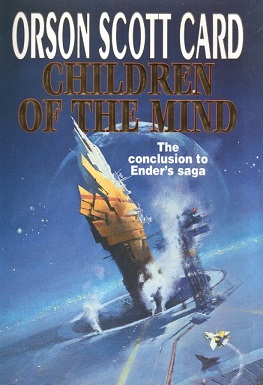
Children of the Mind (1996) is a novel by American author Orson Scott Card, the fourth in his successful Ender's Game series of science fiction novels that focus on the character Ender Wiggin. This book was originally the second half of Xenocide, before it was split into two novels.

Xenocide (1991) is a science fiction novel by American writer Orson Scott Card, the third book in the Ender's Game series. It was nominated for both the Hugo and Locus Awards for Best Novel in 1992. The title is a combination of 'xeno-', meaning alien, and '-cide', referring to the act of killing, together meaning the act of killing populations of aliens; comparable to genocide.
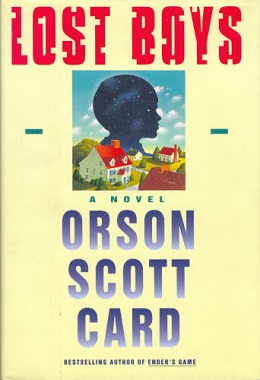
Lost Boys (1992) is a horror novel by American author Orson Scott Card. The premise of the novel revolves around the daily lives of a Mormon family, and the challenges they face after a move to North Carolina. The story primarily follows the family's troubles at work, church, and the oldest child Stevie's difficulty fitting in at school, which lead to him becoming increasingly withdrawn.

Shadow of the Giant (2005) is a science fiction novel by American writer Orson Scott Card, the fourth novel in his Ender's Shadow series, also called the Bean Quartet.
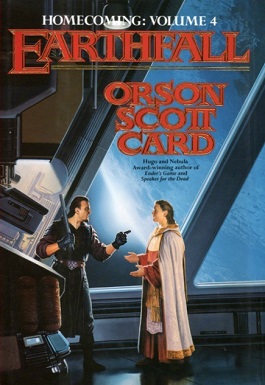
Earthfall (1995) is a science fiction novel by American writer Orson Scott Card. It is the fourth book of the Homecoming Saga, a fictionalization of the first few hundred years recorded in the Book of Mormon.

The Tales of Alvin Maker is a series of six alternate history fantasy novels written by American novelist Orson Scott Card, published from 1987 to 2003, with one more planned. They explore the experiences of a young man, Alvin Miller, who realizes he has incredible powers for creating and shaping things around him.

Enchantment is an English language fantasy novel by American writer Orson Scott Card. First published in 1999, the novel is based on the Ukrainian version of Sleeping Beauty and other folk tales. Various forms of magic, potions, and immortal deities also play an important role in the story.
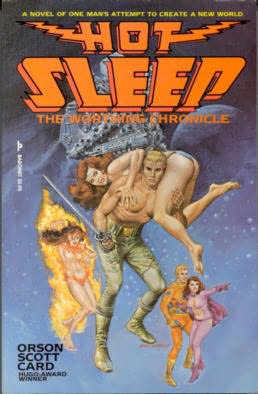
Hot Sleep: The Worthing Chronicle (1979) is a science fiction novel by American writer Orson Scott Card, part of his the Worthing series. Card's novel The Worthing Chronicle (1983) covers some of the same ground.
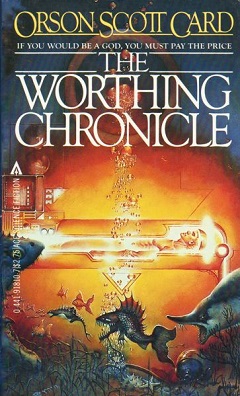
The Worthing Chronicle (1983) is a science fiction novel by American writer Orson Scott Card, part of The Worthing series. This book by itself is out of print having been published along with nine short stories in the collection The Worthing Saga (1990).

Shadows in Flight is a science fiction novella by American writer Orson Scott Card. When released in 2012, it became the twelfth book published in the Ender's Game series. The story follows on from where the original four "Shadow series" books left off. It is about Bean and his children discovering an ancient Formic "ark" during their journey in space. It was released in January of 2012. It was nominated for the Goodreads Choice Award for science fiction.

Lovelock is a 1994 science fiction novel by American writers Orson Scott Card and Kathryn H. Kidd. The novel's eponymous narrator, a sentient monkey, takes his name from James Lovelock, the scientist-inventor who formulated the Gaia hypothesis, which figures heavily in the book.
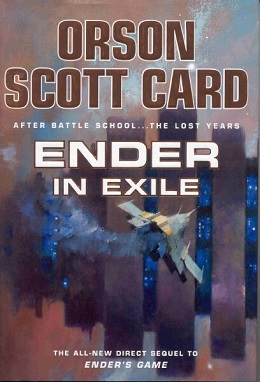
Ender in Exile is a science fiction novel by American writer Orson Scott Card, part of the Ender's Game series, published on November 11, 2008. It takes place between the two award-winning novels Ender's Game and Speaker for the Dead. It could also be considered a parallel novel to the first three sequels in the Shadow Saga, since the entirety of this trilogy takes place in the span of Ender in Exile. The novel concludes a dangling story line of the Shadow Saga, while it makes several references to events that take place during the Shadow Saga. From yet another perspective, the novel expands the last chapter of the original novel Ender's Game. On the one hand, it fills the gap right before the last chapter, and on the other hand, it fills the gap between the last chapter and the original (first) sequel. Ender in Exile begins one year after Ender has won the bugger war, and begins with the short story "Ender's Homecoming" from Card's webzine Intergalactic Medicine Show. Other short stories that were published elsewhere are included as chapters of the novel.
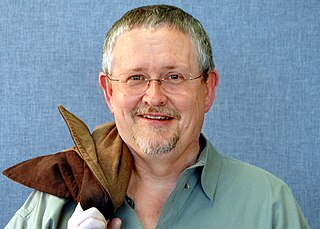
Orson Scott Card is an American writer known best for his science fiction works. He is the only person to have won a Hugo Award and a Nebula Award in consecutive years, winning both awards for his novel Ender's Game (1985) and its sequel Speaker for the Dead (1986). A feature film adaptation of Ender's Game, which Card co-produced, was released in 2013. Card also wrote the Locus Fantasy Award-winning series The Tales of Alvin Maker (1987–2003).
Treason is a crime that covers a variety of extreme acts against one's sovereign or nation.

Invasive Procedures (2007) is a medical thriller by American writers Orson Scott Card and Aaron Johnston. This novel was based on the short story "Malpractice" by Card, which first appeared in the Analog magazine in 1977.
"In the Doghouse" is a science fiction short story by American writers Orson Scott Card and Jay A. Parry. It appears in his short story collection Maps in a Mirror. Card originally published this story in the December 1978 issue of Analog Science Fiction and Fact.
"Salvage" is a short story by American writer Orson Scott Card, originally published in the February 1986 issue of Asimov's Science Fiction magazine. It appears in Card's short story collection The Folk of the Fringe and was also reprinted in the anthologies Wastelands: Stories of the Apocalypse and The End of the World: Stories of the Apocalypse.

















